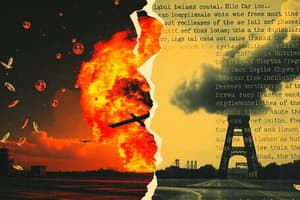Podcast
Questions and Answers
What is nuclear fission?
What is nuclear fission?
- The emission of alpha particles from a radioactive substance
- The conversion of mass directly into energy
- The process of splitting a heavy nucleus into two lighter nuclei (correct)
- A process of combining light nuclei to form a heavier nucleus
Which of the following elements is commonly used as fuel in nuclear fission reactors?
Which of the following elements is commonly used as fuel in nuclear fission reactors?
- Oxygen
- Hydrogen
- Carbon
- Uranium-235 (correct)
During nuclear fission, what is released in addition to the two smaller nuclei?
During nuclear fission, what is released in addition to the two smaller nuclei?
- Protons and beta particles
- Electrons and gamma rays
- Neutrons and energy (correct)
- Alpha particles and light
Which of the following best describes the energy released during nuclear fission?
Which of the following best describes the energy released during nuclear fission?
What role do neutrons play in a nuclear fission chain reaction?
What role do neutrons play in a nuclear fission chain reaction?
Which of the following is an example of a material used as a moderator in nuclear reactors?
Which of the following is an example of a material used as a moderator in nuclear reactors?
In a nuclear reactor, the purpose of control rods is to:
In a nuclear reactor, the purpose of control rods is to:
Which of the following is a common by-product of nuclear fission in a reactor?
Which of the following is a common by-product of nuclear fission in a reactor?
What is a major challenge associated with nuclear fission as a source of energy?
What is a major challenge associated with nuclear fission as a source of energy?
In which type of nuclear reaction does a chain reaction occur?
In which type of nuclear reaction does a chain reaction occur?
Flashcards are hidden until you start studying
Study Notes
Nuclear Fission
- Nuclear fission is the process of splitting a heavy nucleus into two lighter nuclei.
- Uranium-235 is a commonly used fuel in nuclear fission reactors.
- During nuclear fission, neutrons and energy are released, in addition to the two smaller nuclei.
- The energy released during nuclear fission is the result of the conversion of mass into energy according to Einstein's equation, E=mc².
- Neutrons play a crucial role in a nuclear fission chain reaction by causing the fission of other nuclei, sustaining the reaction.
- Graphite is an example of a material used as a moderator in nuclear reactors.
- Control rods in nuclear reactors absorb excess neutrons to regulate the chain reaction.
- Plutonium is a common by-product of nuclear fission in a reactor.
- A major challenge associated with nuclear fission as a source of energy is the long-lived radioactive waste it generates.
- Chain reactions occur in nuclear fission.
Studying That Suits You
Use AI to generate personalized quizzes and flashcards to suit your learning preferences.



